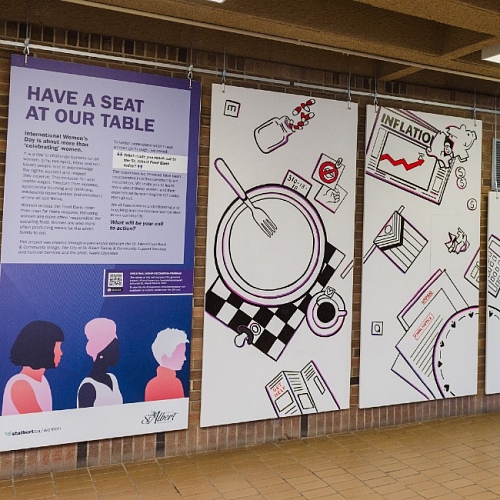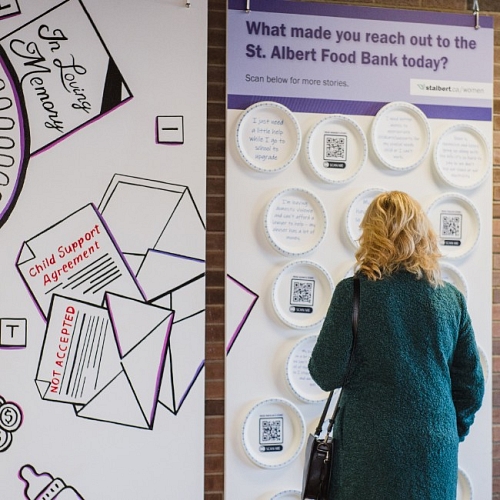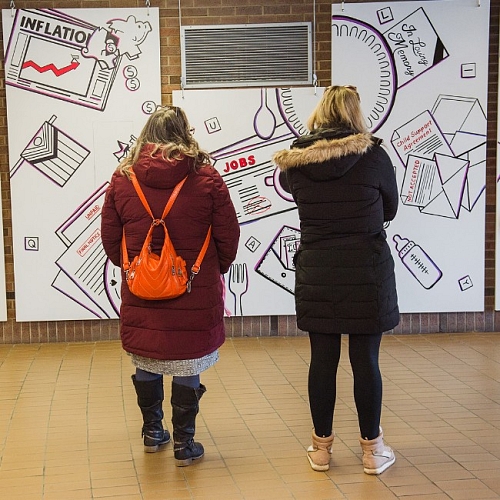Stories of Barriers to Equity
The following is a compilation of real women’s stories. Details and names have been altered, and stories meshed together to maintain confidentiality. Please be aware that these situations are complex, and we have only shared a short snapshot of the story and the process of accessing support services. The journey to accessing benefits and services can be a long process; there are forms, waiting lists and, at times, a lack of availability. We hope that in these snapshots, awareness is raised of the barriers some women face and increase interest in exploring our role in eliminating these barriers.
Barriers to women’s equity can be triggering. Resources are available if you need support.
Stories on this page
Maggie's Story
Maggie was doing ok until she miscarried. Until now, she was managing the demands of life and all the expenses and has not needed to go the Food Bank for a few years. Taking time off work with no sick benefits put a strain on the family’s finances. She had to call the Food Bank when ongoing complications of the miscarriage caused her to need period products daily for over a month. She was embarrassed to talk her husband about this and felt she couldn’t take any more dollars away from their food budget for menstrual supplies. Her 6-year-old was worried about her and didn’t want to go to school.
Facts:
- Research in Canada shows that 4 out of 5 young persons who menstruate have tried to hide that they are on their period, and 58% have felt ashamed or embarrassed about it. Canada ranks in the bottom half of countries surveyed regarding society’s support of talking openly about periods.
- It is estimated that Canadians who menstruate typically spend up to $6,000 in their lifetime on period products. Those who live in remote, rural and northern communities can expect to pay double the price for the same products found in larger urban communities.
Our Connected Community: The St. Albert Food Bank & Community Village supported Maggie with food and menstrual products and invited her to set up an appointment with the Community Liaison Social Worker to discuss employment and benefits.
Thalia's Story
Thalia couldn’t live without her heart medication. Her partner, Brian, intimidated Thalia by threatening to take away her medication. He kept necessities like food and medication in locked cupboards so that Thalia had to ask for permission. He also monitored and controlled her spending and put parental controls on her cell phone so that Thalia couldn’t access apps like the internet. Brian’s behaviour was becoming more difficult. Thalia didn’t know what to do; for years, Brian prevented her from going to school and getting a job. If she left, where would she go? A concerned neighbour and friend told Thalia about the Food Bank, so Thalia called them.
Facts:
- Using intimidation and threats to instill fear, compliance and dependence are common coercive control tactics. Control tactics include actions like depriving survivors of necessities like medication and food.
- “Financial abuse occurs when a single person controls all the financial resources (money, property, credit) within a relationship and uses this power as a means to exert control over their partner. A woman experiencing financial abuse may appear to live comfortably but have no control or access to the family’s money.”
Connected Community: The Food Bank & Community Village Community Liaison Social Worker may discuss steps to independent living including Alberta Works escaping abuse benefit (only if Thalia was interested). A referral was made to Stop Abuse in Families (SAiF) and provided information about Jessie’s House, an emergency shelter.
Have you experienced or are currently experiencing or witnessing violence or abuse? Learn more about our violence and abuse support services.
Matilda's Story
Matilda lives in a world that disables her. Born with congenital impairments, Matilda was unable to work her entire life. She now relies on monthly payments from Old Age Security (OAS) and Guaranteed Income Supplement (GIS) to survive but can hardly make ends meet with the rising cost of food and other necessities. She also recently learned that she must move out of the condo she rents. Because she uses a wheelchair, Matilda is worried about finding housing that is wheelchair accessible, affordable and near transit, which she relies on to get to the Food Bank.
Facts:
- According to the Canadian Women’s Foundation, 23% of women with disabilities live on low incomes.
- Almost half of Canadian women ever reporting experiences of homelessness had a disability (Statistics Canada, Mar. 2018).
Our Connected Community: The Food Bank & Community Village Community Liaison Social Worker helped Matilda apply for Alberta Senior’s Benefits and ensured she was receiving federal benefits, such as GST. Staff also referred Matilda to the St. Albert Housing Society, Homeland Housing and the St. Albert Salvation Army.
Quinn & Adrian's Story
Quinn has Multiple Sclerosis, a disease of their* brain and spinal cord. Because of Quinn’s illness, they have trouble maintaining a job and cannot contribute much to household income. Adrian, Quinn’s partner is Indigenous, works as a healthcare worker and is the main provider for both Quinn and their three-year-old toddler, Ella, who has complex needs. Quinn’s illness makes it difficult for them to care for Ella while Adrian is at work. Adrian and Quinn are struggling to pay for childcare, and with the increase in rent, utilities and cost of food, they called the Food Bank.
*Quinn’s pronouns are they/them. Quinn identifies as a non-binary person.
Facts:
- Lack of affordable and accessible childcare is a barrier to paid work and income, and lower-income families are disproportionately impacted by lack of access. Affordable childcare can reduce and eliminate poverty for some families.
- Living in energy poverty is incredibly stressful. Families need to make tough choices about what they power and when, and live under the fear that they could lose all power if they make a wrong choice. Above all, it greatly impacts a family’s sense of dignity.
Our Connected Community: The Food Bank & Community Village Liaison Social Worker suggested that Quinn contact the St. Albert Family Resource Centre to review possible services for Ella. They also explored possible income support for Quinn, such as Assured Income for the Severely Handicapped (AISH), and recommended Quinn apply for a food hamper. If interested, information would be shared for Metis Urban Housing.
Margot's Story
Margot needed help. Being a single working mother during the pandemic meant that Margot’s three children (10, 13, 15) had been alone each day while attending school online from home. Margot couldn’t afford to take time off work and couldn’t find childcare for the youngest with an ongoing pandemic. One of her children is now struggling in school. Margot’s debt is increasing. After paying rent, utilities and other basic needs, little was left for food. Margot was not receiving any financial support from the children’s father and did not know how to locate him. She was ashamed that she could not adequately provide for her children, so she reached out to the Food Bank for support.
Facts:
- 17.9% of Food Bank users are single adults with children, despite only representing 8.7% of Canada’s population.
- “In 2020, a single parent with one child was earning an income $2,065 below the deep income poverty threshold.”
- In March 2022, approximately 1.5 million Canadians accessed food banks, even though unemployment rates were at their lowest on record since 1976.
Our Connected Community: The Food Bank & Community Village Community Liaison Social Worker referred Margot to the St. Albert Family Resource Centre, FCSS Family and School Liaison Program, Big Brothers Big Sisters St. Albert, Edmonton Community Legal Centre and gave her information on out-of-school childcare options and available subsidies.
Alannah's Story
Alannah, a transgender woman, was fired from her job unjustly after transitioning. With no income and bills to pay, Alannah can’t afford a lawyer. To make matters worse, Alannah’s roommate is selling the house. She needs to move out but is worried about finding an apartment she feels safe in. The Food Bank & Community Village helps her when she does not have enough money to buy groceries.
Facts:
- “Gender-diverse individuals are far more likely to report experiencing all forms of [workplace] harassment and violence” (p. 7), including sexual harassment.
- Transgender and gender non-confirming people are twice as likely than the general population to experience severe poverty and homelessness.
Our Connected Community: The Food Bank & Community Village Community Liaison Social Worker referred Alannah to Legal Aid Alberta, Edmonton Community Legal Centre, Alberta Human Rights Commission and Alberta Works.
Amita's Story
Amita’s husband, Jeff, didn’t understand. Amita had recently completed an advanced degree and excitedly began looking for jobs. She received no callbacks or interviews despite extensive experience in her chosen field. As an immigrant woman of colour with English as a second language, her white, English-speaking, Canadian-born husband couldn’t understand her lived experience. Living on one income was difficult and Amita was worried about her family not having enough to eat. Jeff asked Amita to call the Food Bank.
Facts:
- In Canada, resumes with English names receive more callbacks and interview opportunities than people with Greek, Indian, Pakistani, and Chinese origins. Even with Canadian work experience or credentials, callback rates are still lower than people with English-sounding names. In one study, “listing fluency in multiple languages, graduating from a better university, or obtaining a master’s degree did not improve callback rates for foreign-named applicants with Canadian education and experience.”
Our Connected Community: The Food Bank & Community Village Community Liaison Social Worker encouraged Amita to speak with their volunteer Career Counsellor. They also referred Amita to the St. Albert Public Library Career Resource Centre.
Calls to Action
- Learn about Affordable Housing in St. Albert
- Support organizations advocating for better quality childcare in Canada, such as Child Care Now Alberta
- #EmbraceEquity by learning the difference between Equality vs. Equity
- 1 in 3 Albertans have experienced Domestic Violence. Learn to break the cycle of domestic abuse with just a few words with free online webinar Real Talk
- Learn about, consider volunteering and donating to local not-for-profit St. Albert organizations
- Put action into your reaction A Guide to Bystander Intervention
- Listen to those who are different from you. Learn from the people impacted by discrimination and oppression. Be curious. Be kind
- Read Please, Listen by St. Albert's Poet Laureate Lauren Seal, a poem based on themes captured in Have a Seat at Our Table.
Last edited: October 22, 2024






